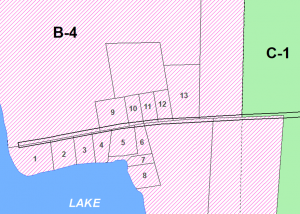Over the years, Kevin has played a key role in helping local communities correct inadvertent zoning errors or improper zoning designations on some properties that may have unnecessarily limited how those landowners could improve their property.
Most recently, 13 residential lots in the Town of Scott were discovered as being zoned “B-4 Planned Commercial-Recreation Business District.” The B-4 district is intended for uses like campgrounds, resorts, go-kart tracks, rifle ranges, and so forth. The B-4 district does not allow single-family residences, which is what primarily exists on the 13 lots. That makes those 13 residences nonconforming, which means none of the residences can have any sort of addition or expansion.
 Even if they could, the side and rear yard setbacks in the B-4 district are 100 feet, which is much too large for these small lots. The owner of one of these homes would not be able to add a shed, deck, or garage, because he/she would not be able to meet the setbacks. The only option for the homeowner would be to seek a variance, which can be time-consuming, includes a fee, and is not always granted.
Even if they could, the side and rear yard setbacks in the B-4 district are 100 feet, which is much too large for these small lots. The owner of one of these homes would not be able to add a shed, deck, or garage, because he/she would not be able to meet the setbacks. The only option for the homeowner would be to seek a variance, which can be time-consuming, includes a fee, and is not always granted.
After determining that none of the Town’s other zoning districts quite fit these lots, Kevin worked with Town officials to create a new residential zoning district called “R-5 Single-Family Residence Lake District,” which featured setbacks of 10 feet or less, depending on the type of structure.
To help landowners who are improperly zoned understand the disadvantages of continuing with their current zoning versus rezoning into a more appropriate district, Kevin creates custom letters explaining the issues. He keeps the letters to one page and strives to avoid technical jargon. The most common question he received in the past was whether a zoning change would impact property taxes. As a result, he now includes the following statement at the bottom of all letters:
Note: A zoning change alone will not result in an increase to a property’s assessed value. Other factors, such as a significant change in the way a property is used, are responsible for assessment increases. (Source: Wisconsin Department of Revenue – Bureau of Assessment Practices.)
Landowners are also glad to hear that their town’s usual rezoning fees are typically waived for zoning corrections that are not the fault of the current owner.

